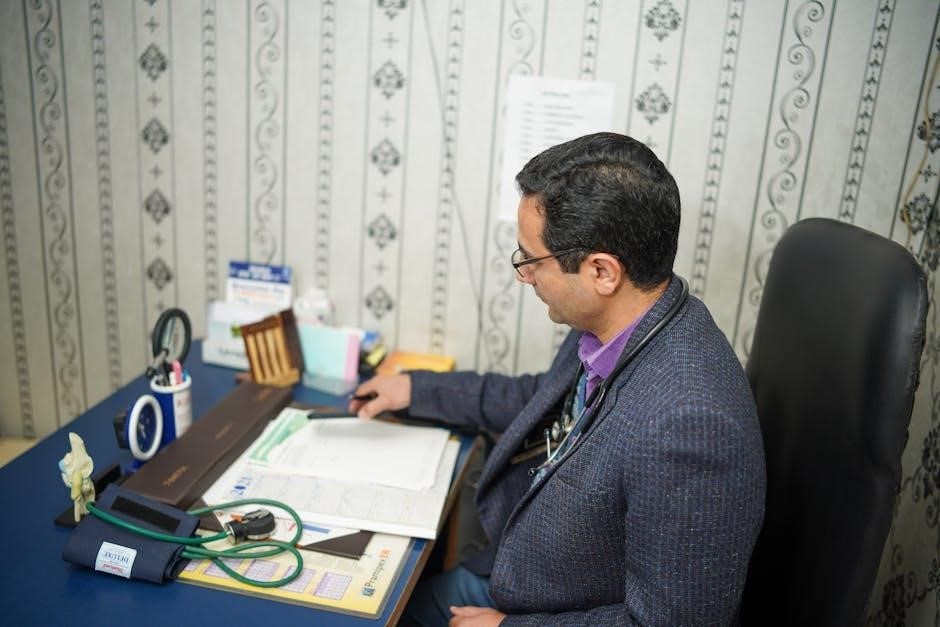Overview of the Diocese of Allentown
The Diocese of Allentown, established in 1961, serves Catholics in eastern Pennsylvania․ It encompasses five counties and is led by the Bishop, overseeing spiritual and administrative matters․
1․1 Historical Background
The Diocese of Allentown was established in 1961, serving eastern Pennsylvania’s Catholic community․ Bishop John R․ McSweeney played a pivotal role in its early years․ The diocese has since grown, with notable leaders like Bishop Welsh, who served from 1983 to 1997․ Its history includes significant record-keeping practices, as seen in the Jane Doe vs․ Diocese of Allentown case, highlighting its administrative evolution and commitment to accurate documentation․
1․2 Mission and Objectives
The Diocese of Allentown’s mission centers on fostering spiritual growth and serving the community․ Its objectives include promoting faith, education, and charity․ The use of the writing folder record sheet PDF reflects its commitment to organized record-keeping, ensuring transparency and accountability in administrative processes, as mandated by the Bishop and diocesan policies, supporting its broader goals of stewardship and pastoral care․

Understanding the Writing Folder Record Sheet
The Writing Folder Record Sheet is a document used by the Diocese of Allentown for organized record-keeping․ It facilitates tracking and managing essential administrative and pastoral information efficiently․
2;1 Purpose and Function
The Writing Folder Record Sheet serves as a centralized tool for maintaining organized records within the Diocese of Allentown․ Its primary function is to track and store essential administrative and pastoral information accurately․ This document ensures that all relevant data, from teacher attendance to canonical records, is readily accessible for efficient diocesan operations, supporting decision-making and compliance with established policies;
2․2 Structure and Components
The Writing Folder Record Sheet is structured to include sections for attendance tracking, complaint forms, and emergency contact details․ It also contains fields for canonical records, teacher attendance logs, and specific forms like the Emergency Medical Record․ Each component is designed to ensure comprehensive data collection, maintaining clarity and organization for efficient administrative processes within the Diocese of Allentown․
Accessing the Diocese of Allentown Writing Folder Record Sheet PDF
Access the Writing Folder Record Sheet PDF through the official Diocese of Allentown website or by contacting the diocesan administrative office directly for assistance․
3․1 Official Sources for Download
The Diocese of Allentown provides the Writing Folder Record Sheet PDF exclusively through its official website and authorized diocesan offices․ This ensures authenticity and compliance with canonical standards; Users are advised to avoid unofficial sources to prevent unauthorized modifications or outdated versions․ The diocese maintains strict protocols to safeguard document integrity and accessibility․
3․2 Steps to Obtain the Document
Visit the official Diocese of Allentown website and navigate to the “Documents” or “Resources” section․ Locate the Writing Folder Record Sheet PDF link, click to download, and save it for completion․ Ensure you have the latest version by cross-referencing the publication date․ For assistance, contact the diocesan office directly via email or phone during business hours․

Completing the Writing Folder Record Sheet
The Writing Folder Record Sheet requires accurate and detailed information to ensure proper documentation․ Each field must be filled thoroughly, adhering to the provided guidelines for submission․
4․1 Required Information and Fields
The Writing Folder Record Sheet requires specific details such as case numbers, dates, and personal information․ Each field must be accurately completed to ensure compliance with diocesan policies․ Case numbers and dates are essential for tracking and reference․ Personal information should be entered precisely to maintain confidentiality and accuracy․ All fields are designed to streamline record-keeping and ensure adherence to canonical and legal standards․
4․2 Submission Guidelines
Completed Record Sheets must be submitted within 120 days of the acknowledgment of receipt․ Ensure all fields are filled accurately and signatures are obtained where required; Submit the document to the Diocesan office via secure methods, maintaining confidentiality․ Late submissions may require additional documentation․ Ensure compliance with canonical and legal standards to avoid delays in processing․

Role of the Bishop in Record-Keeping
The Bishop oversees the accuracy and compliance of records, ensuring adherence to canonical law and diocesan policies․ This role is crucial for maintaining integrity and accountability․
5․1 Oversight and Review Process
The Bishop is responsible for overseeing the record-keeping process, ensuring accuracy and compliance with canonical laws․ He contacts alleged victims within 120 days, conducts thorough reviews, and ensures records are securely stored․ This process reflects the Diocese’s commitment to accountability and trust, maintaining the integrity of all administrative and canonical records․
5․2 Ensuring Accuracy and Compliance
The Bishop ensures all records are accurate and comply with diocesan policies and canonical law․ Regular audits and training are conducted to maintain standards․ This includes verifying data in the Writing Folder Record Sheet and ensuring confidential storage of sensitive information to uphold legal and ethical obligations within the Diocese․
Case Studies and Examples
The Diocese of Allentown’s Writing Folder Record Sheet was notably used in the “JANE DOE VS․ DIOCESE OF ALLENTOWN” case in 2024, highlighting its role in documenting sensitive records accurately․
6․1 Notable Cases Involving the Diocese
A significant case involving the Diocese of Allentown is “JANE DOE VS․ DIOCESE OF ALLENTOWN” (2024)․ This case highlights the importance of maintaining accurate records, as the Writing Folder Record Sheet played a role in documenting sensitive information․ Such cases underscore the necessity of proper documentation in canonical and legal processes, ensuring transparency and accountability within the diocese․
6․2 Lessons Learned from Past Records
Past records reveal the importance of accurate documentation and transparency․ Cases like “JANE DOE VS․ DIOCESE OF ALLENTOWN” highlight the need for secure storage and clear communication․ These lessons emphasize adherence to canonical and legal standards, ensuring accountability and trust within the diocese․ Proper record-keeping also aids in resolving disputes efficiently and maintaining the integrity of diocesan operations․
Legal and Canonical Requirements
The Diocese must adhere to legal and canonical standards, ensuring accurate and confidential record-keeping․ Compliance with these requirements is crucial for accountability and integrity in church operations․
7․1 Compliance with Diocesan Policies
The Diocese of Allentown adheres to strict policies ensuring accurate record-keeping․ The Writing Folder Record Sheet must comply with diocesan guidelines, maintaining confidentiality and integrity․ Records are stored securely, accessible only to authorized personnel, and processed in accordance with canonical law and administrative standards set by the Bishop and diocesan authorities to uphold accountability and transparency in all operations․
7․2 Adherence to Canonical Law
The Diocese of Allentown strictly adheres to canonical law, ensuring all record-keeping practices align with Catholic Church regulations․ The Writing Folder Record Sheet is maintained according to canon law, with the Bishop overseeing compliance․ Records are handled with confidentiality, and canonical procedures guide document storage, access, and disposal․ This ensures the integrity of church records and upholds legal and spiritual standards set by the Vatican and local church authorities;

Record-Keeping Policies and Procedures
The Diocese of Allentown maintains strict confidentiality and data protection protocols․ Records are securely stored, with access limited to authorized personnel, ensuring compliance with diocesan and canonical policies․
8․1 Confidentiality and Data Protection
The Diocese of Allentown prioritizes confidentiality, safeguarding sensitive records from unauthorized access․ Data protection measures include secure digital systems and restricted physical access․ Personnel are trained to uphold privacy standards, ensuring compliance with both diocesan policies and legal requirements․ This commitment protects the integrity of all documents, including the Writing Folder Record Sheet․
8․2 Storage and Maintenance of Records
The Diocese of Allentown employs secure storage solutions for physical and digital records, ensuring longevity and accessibility․ Physical records are stored in climate-controlled facilities, while digital files are maintained on encrypted servers․ Regular audits and backups are conducted to prevent data loss․ Retention schedules are strictly followed, balancing the need for preservation with legal and canonical requirements for record-keeping․

The Writing Folder in Diocesan Administration
The Writing Folder serves as a centralized system for managing documents, ensuring organized record-keeping and efficient access to essential information for diocesan operations and decision-making processes․
9․1 Integration into Administrative Processes
The Writing Folder is seamlessly integrated into the Diocese of Allentown’s administrative framework, streamlining document management․ It enhances collaboration, ensuring all departments access and share records efficiently․ The system supports processes like tracking attendance, managing complaints, and maintaining canonical records, fostering transparency and accountability․ Its integration with tools like the Emergency Medical Record Form highlights its versatility in diocesan operations․
9․2 Impact on Decision-Making
The Writing Folder enhances decision-making by providing clear, organized records․ It ensures transparency, enabling the Bishop and administrators to access accurate data swiftly․ This system supports informed choices, from resolving complaints to managing canonical records, fostering accountability․ The standardized format aids in identifying trends, enabling proactive measures and aligning decisions with diocesan goals and policies for effective governance․
Challenges and Solutions in Record Management
The Diocese faces challenges like data security and accessibility․ Implementing digital storage solutions and training staff ensures efficient management, maintaining confidentiality and compliance with canonical standards effectively․
10․1 Common Issues Faced
- Confidentiality breaches and data protection concerns are prominent challenges․
- Ensuring accuracy in record-keeping is critical but often difficult․
- Storage and maintenance of physical records require significant space and resources․
- Transitioning to digital systems can be slow due to technical limitations․
- Incomplete or outdated forms may lead to compliance issues․
10․2 Best Practices for Improvement
Adopting digital record-keeping systems enhances efficiency and security․ Regular audits ensure compliance and accuracy․ Training staff on data management is essential․ Implementing secure access protocols protects sensitive information․ Standardizing record formats improves consistency․ Collaborating with experts can address technical challenges and streamline administrative processes, fostering a more organized and reliable system for the diocese’s needs․

Future Directions for the Writing Folder System
Future directions may include integrating advanced digital tools, enhancing online accessibility, and streamlining processes for improved efficiency and better user experience․
11․1 Technological Advancements
The Diocese of Allentown is exploring digital solutions to enhance the Writing Folder system, including electronic databases and cloud storage․ Implementing secure, encrypted platforms will improve accessibility and ensure compliance with data protection laws․ Automation tools could streamline record-keeping processes, reducing manual errors and fostering efficiency․ These advancements aim to modernize the system while maintaining confidentiality and integrity of records․
11․2 Enhancing Accessibility and Efficiency
Efforts to enhance accessibility involve creating user-friendly digital platforms for the Writing Folder system․ Implementing search functionalities and cross-platform compatibility ensures ease of access for diocesan staff and stakeholders․ Role-based access controls will protect sensitive information while allowing authorized personnel to retrieve records efficiently․ Real-time updates and automated notifications further streamline administrative processes, improving overall efficiency and coordination within the Diocese of Allentown․
The Diocese of Allentown’s Writing Folder Record Sheet PDF is a vital tool for maintaining accurate and organized records, ensuring transparency, accountability, and efficiency in diocesan administration․
12․1 Summary of Key Points
The Diocese of Allentown’s Writing Folder Record Sheet PDF is a critical document for maintaining accurate records, ensuring compliance with canonical and legal requirements․ It streamlines administrative processes, supports decision-making, and enhances transparency․ The bishop plays a pivotal role in oversight, while confidentiality and data protection are paramount․ Regular updates and adherence to best practices ensure the system’s efficiency and relevance, benefiting both the diocese and its community․
12․2 Final Thoughts on the Importance of Accurate Record-Keeping
Accurate record-keeping is vital for the Diocese of Allentown, ensuring transparency, accountability, and integrity in its operations․ It supports informed decision-making, maintains trust among parishioners, and upholds legal and canonical standards․ The Writing Folder Record Sheet PDF exemplifies this commitment, emphasizing the need for precision and diligence in documenting church activities and ensuring a legacy of responsible stewardship for future generations․
